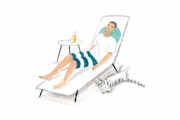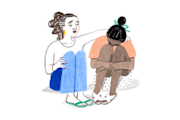Our individual responses to trauma, be it one event or a recurring experience, can vary wildly from person to person.
These emotional responses to trauma and depression, if not dealt with properly, can manifest into physical symptoms, such as chronic pain.
Fibromyalgia is a disorder characterized by widespread musculoskeletal pain accompanied by fatigue, sleep, memory and mood issues.
Researchers believe fibromyalgia amplifies painful sensations by affecting the way your brain and spinal cord process painful and non-painful signals.
In other words, my pain receptors are not aligned with what’s really going on in my body.
While often debated, there is a general consensus that fibromyalgia can be caused by physical trauma, such as an accident, or by significant psychological stress.
My experience with trauma and chronic pain
I know from first-hand personal experience.
When my sister was four and I was eight, our parents divorced. It was ugly.
Being so young and trying to navigate a situation that caused us to feel anxious and scared most of the time ended up causing us physical pain and ailments.
Around age ten or 11, my sister developed an ulcer. She was so anxious and stressed that her stomach literally started eating away at itself.
Separating the physical pain from trauma and depression can be like trying to determine whether the chicken or the egg came first.
I didn’t recognize my own response to my parents’ divorce—but what I did know was I was always exhausted, even as a young child.
By the time I hit my late teens and early 20s, the physical pain began to present itself. It would be 20 years and almost as many doctors before I finally received a diagnosis of fibromyalgia.
Can chronic pain be caused by depression and trauma?
Mental health disorders that are co-morbid or often associated with fibromyalgia are post-traumatic stress disorder (PTSD) and depression aka major depressive disorder (MDD).
Almost all fibromyalgia patients suffer from some level of depression, ranging anywhere from minor to severe.
Similarly, many individuals who've experienced trauma and depression present symptoms of physical pain, as well.
According to the National Institutes of Health (NIH), physical symptoms are very common in depression. Some people suffering from depression only present physical pain.
This can make it difficult for doctors and clinicians to diagnose the root problem. Separating the physical pain from depression can be like trying to determine whether the chicken or the egg came first.

How does physical pain affect mental health?
As with most mental health conditions, depression is not just one sided.
An article from Harvard Medical School notes that “Pain, especially chronic pain, is an emotional condition as well as a physical sensation.”
In one of the best, most accurate explanations of the depression-pain connection, the author writes:
“In those ways, it resembles depression, and the relationship is intimate. Pain is depressing, and depression causes and intensifies pain. People with chronic pain have three times the average risk of developing psychiatric symptoms—usually mood or anxiety disorders—and depressed patients have three times the average risk of developing chronic pain.”
How can you treat pain when you don’t know if it's psychological or physical?
Having chronic pain may mean setting boundaries.
In my case, I’ve learned the hard way that I shouldn’t be doing anything where I can get physically bumped or bounced around.
If I do, my fibromyalgia will without a doubt cause my pain receptors to go into overdrive.
This means no roller coasters, no water slides, and I have to be really careful when I ski (although I still do it—everyone needs a cheat day now and then).
These restrictions can become more severe over time, leading to loss of sleep, lack of appetite, and, yes, an increase in depression.
The good news is, if there was ever a “good” time to have chronic pain, it’s now.
There are more books and research available that help explain the various kinds of chronic pain, the potential causes (if not already known), and available treatment options.

Depression and chronic pain sufferers can benefit from talk therapy, cognitive behavioral therapy (CBT), pain-centered clinics, mindfulness-based therapy (MBT), and specialty massages, along with chiropractors and restorative yoga (which is specifically designed to gently address issues that commonly affect those with physical restrictions).
Some of these treatments may feel uncomfortable—physically, mentally, or both—but with a willingness to be open and honest about your symptoms, there are options available that can help separate the depression and physical pain and hopefully make both more bearable.
Concerned you might be depressed?
Take our online depression assessment to determine whether you are experiencing symptoms of depression. It's free, quick, confidential, and clinically validated.
Find help with trauma, depression, and chronic pain
If you experienced trauma, depression, or you're living with chronic pain, it’s important to reach out to a doctor or mental health professional, such as a therapist, for support.
The Monarch Directory by SimplePractice can connect you with licensed therapists who specialize in treating depression, as well as mental health professionals who specialize in trauma and helping clients experiencing chronic pain.
Many therapists on Monarch offer free 15-minute initial consultations and in-person or telehealth video therapy sessions.
You can quickly and easily view their availability and book a therapy session. Many offer free 15-minute initial consultations and in-person or teletherapy video sessions.
If you have health insurance coverage, you can also browse therapists who accept your insurance. Taking time to prioritize your mental health may help improve or even alleviate some of the physical pain you're experiencing.
READ NEXT: 5 Surprising Symptoms of Trauma
Need to find a therapist? The Monarch Directory by SimplePractice can help you find licensed therapists near you who specialize in treating depression, as well as those who specialize in trauma and helping clients with chronic pain.









